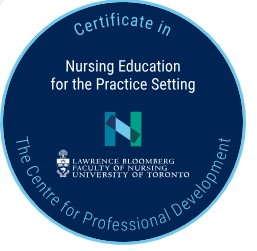Nursing Education 2 Design, Development & Delivery
This 10-week online course focuses on the practical application of theory and evidence on the design, delivery and facilitation of nursing education in the practice setting.
The course will include:
- Development of learning needs assessments for individuals and groups.
- Creation of learner-centered goals and objectives.
- Incorporation of diverse approaches and techniques for educational program design and delivery.
- Consideration of practical and operational needs for delivery of educational programs.
Audience
Nurses and health professionals with an interest in nursing education in the practice setting. This course will be of importance to those who have current responsibilities for nursing education and/or professional practice as a component of their roles who wish to enhance their knowledge as well as for those considering a role in nursing education as a career opportunity.
Contact Hours: This course is equivalent to 40 instructional/contact hours per course, plus additional study time. It is estimated that up to 8 hours of engagement per week is required for successful completion.
Course Objectives
By the end of this course participants will be able to:

Each course in this Certificate program is approved as a micro-credential with eCampus Ontario.
Link to Ontario Micro-credentials portal https://microlearnontario.ca/
Please Note: This is one of three required courses for the “Certificate in Nursing Education for the Practice Setting”. Learners may take this as an individual course without completing the full certificate requirements; however, if taken as part of the certificate, all three required courses must be completed within a three-year period. The other two courses are:
- Nursing Education for the Practice Setting: Theoretical Perspectives and Context
- Nursing Education for the Practice Setting: Assessment & Evaluation
A passing grade of 70% is set for each course. Courses may be taken in any order. Courses offered by the Centre for Professional Development cannot be credited towards a degree program.
Course Outline
This is a 10-week online course accessed through the University of Toronto’s Learning Portal – Quercus. It is primarily self-paced; however participants are required to engage in discussions and submit activities/assignments within identified timelines (weekly). It is estimated that up to 8 hours of study per week is required for successful completion.
In each of the 10 weeks, participants are expected to:
- View an e-learning module
- Read required readings
- Participate in the learning activities/assignments
Learning activities and the culminating assignment will provide opportunity for reflection and demonstration of learning. For this course, the learning activities/assignments include:
| Weekly Progress | Learning Module Topics | Evaluative Components |
| Week 1 | – Introduction to Course Developing and Conducting Learning Needs Assessments | – Introductions Discussion Board Post |
| Week 2 | Developing Goals, Objectives and Outcomes – Part 1 | Learning Activity |
| Week 3 | Developing Goals, Objectives and Outcomes – Part 2 | LIVE Session |
| Week 4 | Modes of Delivery 1: The Context of Teaching and Learning | Culminating Assignment – Part 1 |
| Week 5 | Modes of Delivery 2: Instructional Design | LIVE Session |
| Week 6 | Modes of Delivery 3: Working with Groups | Discussion Board Post |
| Week 7 | Modes of Delivery 4: Working with Individuals | Discussion Board Post |
| Week 8 | Using Evidence to Inform Content Delivery | Culminating Assignment – Part 2 |
| Week 9 | Planning For and Supporting Learners from Formal Educational Environments | LIVE Session |
| Week 10 | Planning For and Supporting Learners from Formal Educational Environments | Culminating Assignment – Final |
Course Director

Leasa Knechtel
Executive Director, Centre for Professional Development
Assistant Professor, Teaching Stream
Course Instructors
René Samuda
Clinical Nurse Educator, William Osler Health System Emergency Services Program
Adjunct Lecturer, Lawrence Bloomberg Faculty of Nursing, University of Toronto
Karen Fleming
(she/her), RN, MN, MSHS, CHSE ®
Senior Clinical Inclusion, Diversity, Equity, Accessibility, and Anti-Racism Lead for Lakeridge Health
Registration Information
Fees
- Early Bird price (ends December 12, 2026)
- $900 + HST
- Regular price (starts December 13, 2026)
- $1008 + HST
- U of T Nursing Alumni save 15%*
- $855 + HST
- U of T Nursing Faculty save 15%**
- $855 + HST
Site Groups
A group discount rate is available for site groups of three or more people. For details please contact pd.nursing@utoronto.ca.
Other Courses in this Certificate Program
Nursing Education 1: Theoretical Perspectives and Context
This 10-week online course focuses on the development of a foundational knowledge base in education theory and pedagogical issues relevant to nursing education in the practice setting. Participants will explore […]
Nursing Education 3: Assessment and Evaluation
This 10-week online course focuses on development of a foundational knowledge base in education assessment and evaluation relevant to nursing education in the practice setting. Participants will: Explore current and […]
Please Note
- Refund Policy – To withdraw from a course, send a written request to pd.nursing@utoronto.ca by December 12, 2025. No refunds will be given after this date. All refunds are subject to an administrative fee of $100 + tax. Alternatively, a colleague may attend in your place. Please send your substitution request at least 3 days prior to the course to pd.nursing@utoronto.ca.
- Registration is limited.
- Register deadline: January 12, 2026
- *U of T Nursing Alumni discount is available to BScN, MN, PMNP Diploma, MScN or PhD graduates of the Lawrence Bloomberg Faculty of Nursing, University of Toronto.
- **U of T Nursing Faculty discount is available to individuals with a faculty position, adjunct or status appointment, or are a Clinical Instructor (current academic year only) at the Lawrence Bloomberg Faculty of Nursing, University of Toronto.
- Student in U of T Faculty of Nursing discount is available to individuals currently registered in the BScN, MN, PMNP or PhD programs at the Lawrence Bloomberg Faculty of Nursing.
- Applicable taxes (13% HST) will be added to the registration fees.
- Course Cancellation Policy – The Centre for Professional Development reserves the right to cancel courses due to circumstances. The decision to cancel a course is normally made 15 days prior to the course. If you are enrolled in a course which is subsequently cancelled, you may apply your fee to another course, or receive a full refund. The Centre is not responsible for any travel or other expenses incurred by you.